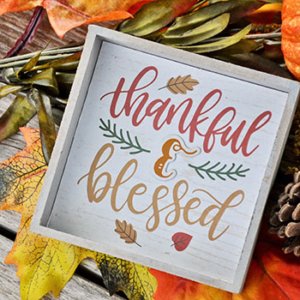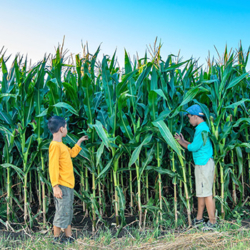Happy Thanksgiving, everyone! In 2020, we should name this November holiday, “Thanksgiving in the Time of COVID”.
Sometimes, we can all agree, it is hard to be thankful amidst adversity. This year’s pandemic, coupled with the rancor in society and politics, has made 2020 a challenge, but it has made me realize that I’m still thankful for so much.
I have been fortunate to not contract COVID. Some of my family and loved ones have suffered mild symptoms, while most have avoided the illness altogether. Others, as we all know, have suffered grievously even unto death from the illness. As we celebrate our bounty and good health, our hearts and sympathies must go out to those who suffer.
I also decided not to buy into the stress and distress over the elections this year. Isn’t it remarkable that in a country where the populace is essentially split down the middle over their political choices, we have a system that works? Yes, the losers always seem to complain ad nauseam, but the process continues to work, and the people have an influential voice in our system.
We still have great freedoms in America, despite our on-going struggle to balance the good of the one vs. the good of the many. As Sly Stone sang years ago, “Thank you falettinme Be Mice Elf Agin”. To a large extent, and perhaps more than anywhere else in the world, we live in a country where we can be and do what we wish. That’s worth a note of thanks, wouldn’t you say?
 A Timeless Thanksgiving Tradition
A Timeless Thanksgiving Tradition
Thanksgiving in America dates back to 1621, when the settlers in Plymouth, Massachusetts celebrated the harvest festival with the indigenous people of that area. Just under half (45 of 102) of the colonists had died that first winter, but those that remained, celebrated with joyful hearts and vigorous appetites!
But America was by no means the first to celebrate a bountiful harvest by giving thanks. History records numerous cultures celebrating harvest festivals back into antiquity. The Romans, Greeks, Persians, Egyptians, Indonesians, Chinese, Sumerians and other ancient societies celebrated the harvest thousands and thousands of years ago by giving thanks to the powers they understood to be responsible for a plentiful yield.
Thanksgiving in America was first memorialized in the first presidential term of George Washington in April of 1789. Washington issued a proclamation on October 3rd of that same year designating Thursday, November 26, 1789 a national day of thanks.
Later, in 1863 during the midst of a great civil war, President Abraham Lincoln issued a proclamation designating a day of thanksgiving that year. His reasoning was soundly rooted in thanksgiving despite the animosity of war.
 I think Abraham Lincoln’s message is a great one for us this year. In case you don’t have to time to read it, I’ll give you a snippet:
I think Abraham Lincoln’s message is a great one for us this year. In case you don’t have to time to read it, I’ll give you a snippet:
“Needful diversions of wealth and of strength from the fields of peaceful industry to the national defence, have not arrested the plough, the shuttle or the ship; the axe has enlarged the borders of our settlements, and the mines, as well of iron and coal as of the precious metals, have yielded even more abundantly than heretofore. Population has steadily increased, notwithstanding the waste that has been made in the camp, the siege and the battle-field; and the country, rejoicing in the consciousness of augmented strength and vigor, is permitted to expect continuance of years with large increase of freedom.” – Abraham Lincoln, October 3, 1863.
The Intentional Giving of Thanks
When I was in what we used to call “primary school” one of our morning songs repeated the lyrics “Count your many blessings, name them one by one”. I don’t remember the rest of the lyrics, but that one still resides in my brain these many years later.
It does seem to be a choice doesn’t it? One can focus on the blessings and move ever onward to higher ground, or one could choose to be defined by sorrows and travails. Abraham Lincoln wrote of the blessings bestowed upon America while factions battled to tear it apart. About two thousand years ago (give or take) the apostle Paul wrote to the young church at Thessalonica and encouraged them to “give thanks in all circumstances”. I have heard some scholars (and I am happily not a Greek scholar) say a ‘better’ translation would be to “give thanks for all circumstances”. I’m getting better at “in all circumstances”, but “for all circumstances” is still in the future for me. As I have said before, and as you know all too well, I’m a work in progress.
I hope you will mull over these thoughts and find some inspiration and encouragement in them. Thank you for letting me share them with you. Also know, as I count my many blessings and joys, you are numbered there.
Lorin Bice
November 2020





